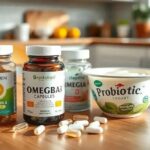Vitamin D is essential for health, supporting bone strength, boosting mood, and enhancing immune function; it can be obtained from sunlight, fatty fish, fortified foods, and high-quality supplements.
Do you realize how crucial Vitamin D is, especially as we cross the big 3-0? It’s more than just a vitamin; it’s vital for your overall health and well-being. Let’s explore what it does for you!
Join Thousands of Women Rediscovering Their Energy
This gentle method gave me back the vitality I thought was gone forever
The importance of vitamin D for health
Vitamin D is crucial for maintaining a healthy body and mind. It plays a significant role in bone health by helping your body absorb calcium, which is essential for strong bones and teeth. A deficiency in vitamin D can lead to complications like osteoporosis, increasing the risk of fractures.
Moreover, vitamin D is linked to your immune system, helping to fend off infections and chronic diseases. Studies suggest that adequate levels of vitamin D can reduce the risk of illnesses such as heart disease and certain cancers.
This vitamin also affects your mood and mental health. Research shows that low levels of vitamin D may be associated with feelings of depression and anxiety. By maintaining sufficient levels, you can support your emotional well-being.
Lastly, sunlight is a natural source of vitamin D. Just about 10-30 minutes of midday sun exposure several times a week can help maintain healthy vitamin D levels. However, if sunlight is scarce, consider incorporating vitamin D-rich foods into your diet like fatty fish, egg yolks, and fortified products.
How vitamin D impacts mood and energy
Vitamin D plays a vital role in regulating mood and influencing your energy levels. Research indicates that having adequate vitamin D levels can positively affect your mental health. Studies have shown that individuals with low levels of vitamin D are more prone to depression and anxiety.
When sunlight hits your skin, it triggers the production of vitamin D, which helps enhance your serotonin levels. This “feel-good” hormone helps boost your mood and may alleviate feelings of sadness and fatigue. With proper levels of vitamin D, you may find that your overall energy levels are higher.
In addition to sunshine, certain foods can help maintain vitamin D levels in your body. Consuming fatty fish, such as salmon and mackerel, as well as fortified dairy products or cereals, can provide the necessary amounts of this important vitamin. Keeping your vitamin D levels in check can be a natural way to improve your energy and overall well-being.
If you feel persistent fatigue or mood swings, it may be worthwhile to check your vitamin D levels. A simple blood test can reveal whether you are deficient, allowing you to take action to improve your health.
Sources of vitamin D: food and sunlight
Vitamin D is essential for overall health, and there are two main sources to obtain it: sunlight and food.
One of the best natural sources of vitamin D is direct sunlight. When your skin is exposed to sunlight, your body synthesizes vitamin D. It is best to spend about 10-30 minutes in the sun several times a week, depending on your skin type and location. The sun’s rays are strongest between 10 a.m. and 3 p.m., making this the ideal time to catch some rays.
However, during winter or in places with limited sunlight, it’s important to turn to dietary sources. Foods rich in vitamin D include fatty fish like salmon, mackerel, and sardines. Additionally, fortified foods such as milk, orange juice, and cereals are great options to boost your intake.
Egg yolks and cheese also contain small amounts of vitamin D. If you find it challenging to get enough vitamin D from sunlight or food alone, consider discussing supplementation with a healthcare provider. They can recommend the right dosage based on your needs.
Choosing the right supplements for vitamin D
Choosing the right supplements for vitamin D can significantly impact your health, especially if you struggle to get enough from sunlight and food.
First, it’s important to understand the two main forms of vitamin D in supplements: D2 (ergocalciferol) and D3 (cholecalciferol). D3 is generally considered more effective at raising and maintaining the level of vitamin D in your bloodstream.
When selecting a supplement, look for one that contains vitamin D3. Check the dosage; typical recommendations range from 600 to 800 IU per day for most adults, but some may need higher doses based on their health background, age, or if they have been diagnosed with a deficiency.
Next, consider the quality of the supplement. Choose brands that are third-party tested to ensure purity and potency. Look for certifications from recognized organizations, which can provide confidence in the product’s effectiveness.
Be mindful of your lifestyle and nutritional needs. If you’re a vegan or vegetarian, opt for vegan-friendly supplements that derive vitamin D3 from lichen instead of animal sources.
Before starting any supplement, it’s wise to consult with a healthcare provider. They can help determine the right dosage and ensure it fits into your overall health plan.
Wrapping Up the Importance of Vitamin D
Vitamin D is essential for overall health, helping to maintain strong bones, elevate mood, and strengthen your immune system. Getting enough vitamin D from sunlight and food is vital, especially as we age.
When sunlight is limited, choosing the right supplements can help bridge the gap. Opt for high-quality vitamin D3 to ensure you’re supporting your body effectively.
By prioritizing your vitamin D levels, you can enhance your well-being, boost your energy, and promote a healthier life. Don’t forget to talk to your healthcare provider about the best ways to meet your vitamin D needs.
FAQ – Frequently Asked Questions About Vitamin D
What is the best source of vitamin D?
The best natural source of vitamin D is sunlight. Your skin produces vitamin D when exposed to the sun. Foods like fatty fish and fortified products are also excellent sources.
How much vitamin D do I need daily?
Most adults need about 600 to 800 IU of vitamin D per day, but it can vary based on age and health conditions.
Can a deficiency in vitamin D affect my mood?
Yes, low levels of vitamin D are linked to feelings of depression and anxiety. Maintaining sufficient levels can help improve your mood.
Is it safe to take vitamin D supplements?
Vitamin D supplements are generally safe, but it’s important to consult with a healthcare provider to determine the right dosage for your needs.
What are the signs of vitamin D deficiency?
Common signs include fatigue, frequent infections, bone pain, and muscle weakness. A blood test can confirm if you have a deficiency.
Can I get enough vitamin D from diet alone?
It can be challenging to get enough vitamin D from food alone, especially if you have limited sun exposure. Supplements may be needed.
Join Thousands of Women Rediscovering Their Energy
This gentle method gave me back the vitality I thought was gone forever







